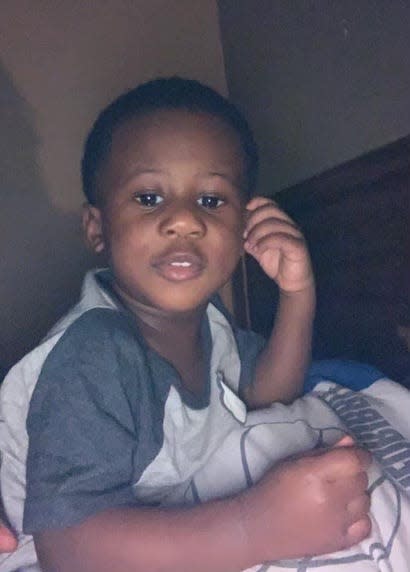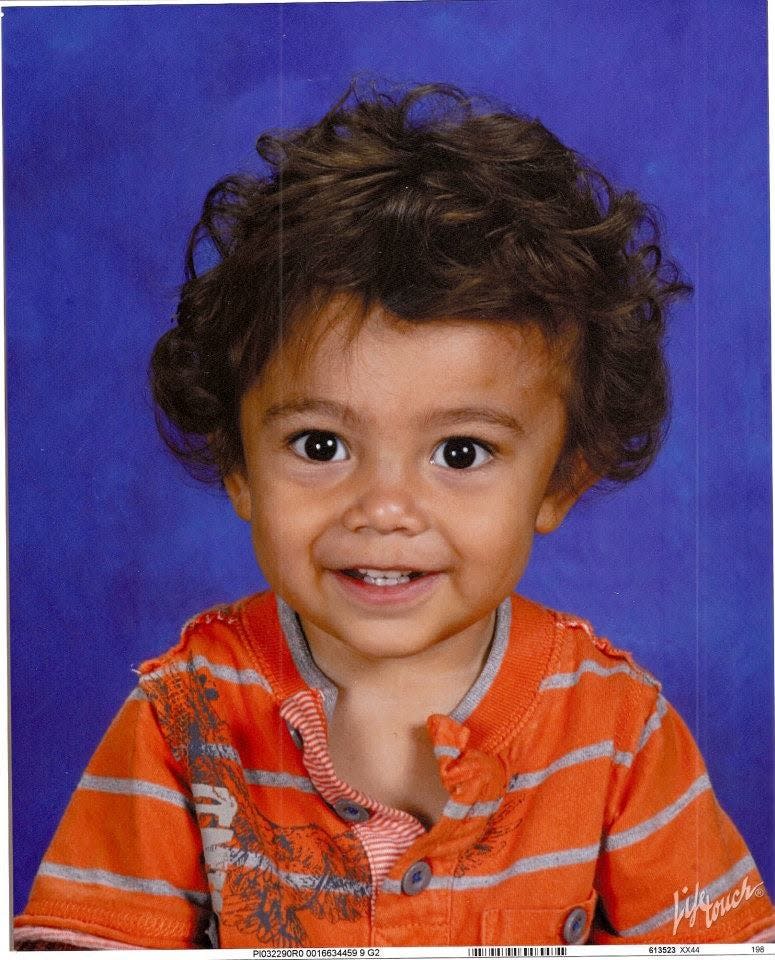A child dies every 6 days amid custody fights, family court lapses. Advocates want change.
In 2021, Rashawd Hines knew he had to act when his son cried each time before returning to his mother’s house.
So the Lakeland, Florida, man wrote a letter to a Polk County clerk’s office in Florida requesting a family court hearing to gain full custody of Jayden, just 2. In the letter, Hines wrote he feared for the safety of his boy, but the court did not immediately act on his request.
Less than two months later, Jayden suffered blunt-force trauma while under the care of his mother’s boyfriend. He had bruises all over his body, cuts and bruises to his liver, brain bleeding caused by a head injury and a human bite mark on his forearm, according to the medical examiner’s autopsy.

The boyfriend, Alegray Damiah Jones, was charged with first-degree murder and aggravated child abuse in the boy's April 2021 death. Jones pleaded not guilty, and the case is pending in Polk County Circuit Court. An attorney representing Jones did not return requests for comment from USA TODAY.
Nearly every six days in the U.S., a child is killed amid a custody dispute, family court lapse, or other mishaps. Each death is a tragedy. Collectively, these cases reveal a national crisis in the family court system that regularly misses warning signs and exposes too many kids to abuse and death, advocates say.
The San Rafael, California-based nonprofit Center for Judicial Excellence's report released Monday found 944 children were killed by a divorcing or separating parent or another parental figure since 2008. Family courts involved in these cases often miss signs of trouble and put children in harm’s way through decisions that prioritize parental visitation even in cases where there are signs of abuse, advocates say.
The nonprofit said its review of family court actions found 137 deaths were preventable homicides. In these cases, the Center for Judicial Excellence found evidence that a protective parent sought to restrict an abusive parent’s access to the underage victims, or that there were risk factors that should have been detected by a trained judge or child advocate.
A handful of deaths involved "system failures," the center said, such as law enforcement or child protective services failing to enforce a court order to prevent an abusive parent from accessing a child.
“There is a crisis in the family court system that is putting children in danger,” said Kathleen Russell, executive director of the Center for Judicial Excellence. “When a child is murdered, the system failed. It’s irrefutable evidence that something went wrong.”
Prioritize children's safety
Russell’s organization researched and compiled a list of child homicides from news reports and databases such as the National Gun Violence Archive. No government agency tracks this information, so Russell’s organization compiled the tragic cases and will share findings with federal and state lawmakers.
Deaths vary by year. The report found child deaths range from a low of 24 in 2008 to a high of 83 in 2011. There were 64 deaths in 2022, the most since 77 kids were killed in 2016. The Center for Judicial Excellence reported 30 deaths this year through the end of June.
Gun violence was the leading cause of death for these kids, accounting for 445 homicides, followed by blunt force, stabbing, strangulation/asphyxiation and drowning. Fathers were accused in 71% of cases, mothers in 17% of cases while others were implicated in 12% of cases.
The center said the report likely does not capture all U.S. child deaths caused by divorcing, separating or court-involved parents or parental figures because cases were primarily detected through news reports, independent database checks and interviews with parents willing to share their stories. The center also said it does not have the resources to check the court records of all 944 cases in the nonprofit's database. As a result, the center warned "there are likely many more preventable tragedies"
The report also highlights problems and recommends changes to family courts to prevent such tragedies from occurring.
Some suggested fixes:
◾ Custody and visitation decisions should prioritize children’s safety over shared parenting.
◾ Train judges and family court personnel to recognize signs of abuse, neglect, or otherwise dangerous situations.
◾ Use evidence-based tools to identify risk and potentially lethal situations.
◾ Provide free legal counsel for low-income parents who are involved in custody proceedings.
◾ Better coordinate and communicate risk across agencies and organizations such as courts and child protection services with professionals such as school staff or health care workers who must report abuse.
Last month, in a report to the United Nations Human Rights Counsel, an official warned family courts tend to dismiss histories of domestic violence and abuse when deciding custody cases. Reem Alsalem, United Nations Special Rapporteur on violence against women, said courts tend to default to shared custody, a decision that could expose children to “lasting harm.”
Judicial experts concede there’s room for improvement in the family court system. David B. Katz, a Superior Court judge in New Jersey, is president of the National Council of Juvenile and Family Court Judges. He said judges and court workers should be trained on how to detect "red flags" that might indicate signs of domestic violence or abuse.
He said it's important for judges and court workers to collect good information from parents or others involved in custody disputes. That can be challenging when a person is unfamiliar with a court's procedures or jargon and does not have the resources to hire an attorney. A common example, Katz said, is a parent whose current or former partner violates a restraining order, but the parent does not share that information with a judge because they don't think it's relevant.
Still, he said it's important for decision-makers to learn from cases when children or harmed or killed. Many states have formed fatality or near-fatality review boards to examine such cases.
"You have to look at these cases,” Katz said. “You have to be willing to have constructive, hard conversations. That's how we learn.”
'I remember how cold his hair felt'
For mothers like Hera McLeod, tragic circumstances have fostered a resolve to change laws to better protect kids in abusive situations. She pushed for 2022 Maryland legislation that requires new judges and magistrates presiding over abuse cases to complete 20 hours of child abuse and domestic violence training.
McLeod become an activist after her 15-month-old son Prince was killed by his father more than a decade ago. In 2017, Joaquin Shadow Rams was convicted of capital murder and sentenced to life in prison. A judge concluded Rams planned to kill his son when he took out more than $500,000 in life insurance policies.
McLeod had split from her ex-fiancée after troubling signs emerged. But a family court judge granted Rams unsupervised visits to Prince over McLeod's objections.
Weeks later on an unsupervised visit, Rams called 911 and said Prince had stopped breathing due to a seizure. Prince was hospitalized and declared dead the next day. The medical examiner's autopsy concluded Prince drowned. But Virginia's chief medical examiner overturned the finding a year later and changed the cause of death to "undetermined."

During Rams' trial, medical experts for prosecutors said seizures are common in boys Prince's age and not fatal. Experts testified that the toddler likely suffocated.
"The only thing everyone could agree on was that Prince's father induced a suffocation event, either by water or some other form of suffocation," McLeod said.
When she learned Prince was hospitalized, McLeod hoped to “walk in the hospital room, and he would look at me and we’d hug," she said.
Hours passed before she was allowed to see her son as hospital staff attempted to stabilize or revive him. When she finally was allowed to approach him, she ran her fingers through his curly hair.
“I remember how cold his hair felt,” she said. “My entire body turned to ice. Even before the doctor said anything to me, I just knew. He's not here anymore."
Her anger turned to resolve. She vowed to advocate for children, women and family court reform. She testified before Congress and before state lawmakers. She shared her story.
That's why detailing the 944 children who have been killed by a parent or parental figure is important for the lawmakers, judges and the public to see, she said.
“As the parent whose kid is one of these numbers, I want him to be counted,” McLeod said.
'Children need to be protected'
Child advocates warn children can be harmed quickly following an adverse court decision.
In 2021, New Jersey resident Breanna Micciolo filed for an emergency hearing to get full custody of her son, Corey. She shared warning signs of abuse with the court. But a judge rejected her request to gain full custody of her son.
"The court (sent) me a letter saying that my order was denied, that they felt my son was safe and that he wasn't going to have any irreparable harm," Micciolo said.
A day later, while under his father’s care, Corey, 6, suffered injuries that landed him in a hospital. He died from his injuries on April 2, 2021.
Less than a year after Corey's death, an expert witness concluded the boy died from blunt force impact to the chest and abdomen, according to the Ocean County Prosecutor’s Office.
Corey's father, Christopher Gregor, was charged with murder. No trial date has been set and he remains in custody at Ocean County jail, prosecutors said.
“Since becoming aware Corey was part of their family, my client and his parents made every effort to receive custody and in fact did receive full custody of Corey," said Mario F. Gallucci, Gregor's attorney.
Russell, of the Center for Judicial Excellence, said it's important to track cases and share details with lawmakers who might not be aware of how often children face dangerous and lethal situations.
Her group pushed for federal legislation called Kayden's Law, named after 7-year-old Kayden Mancuso, of Bucks County, New Jersey, who was killed by her father after he was awarded partial, unsupervised custody. The law aims to bolster state courts’ efforts to detect and handle domestic violence and child abuse allegations.
Most divorces and separations never end up before a judge and are settled amicably, she said.
But for contentious cases, the report punctuates what domestic violence experts and researchers have known for decades – divorce or separation can be a lethal time for family members suffering under domestic violence and coercive control.
"Children need to be protected when their parents are going through the family court system," Russell said.
The Associated Press contributed.
Ken Alltucker is on Twitter at @kalltucker, or can be emailed at alltuck@usatoday.com.
This article originally appeared on USA TODAY: Over 940 kids killed during custody battles: Advocates demand reform

